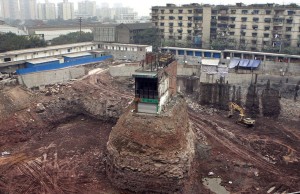By BAILEY BAERWOLF, 2/19/2016. How do one’s urban consumption habits affect the further development of their given city? Does what we buy on a regular basis have a hand in how we will live in the long-term? If so, then how does this development via consumer behavior take shape? How much say does the average urbanite have in these processes?
While working together in a collaborative Urban Design/Architecture studio last semester, my project partner, Jordenn Stewart, and I focused on the conditions of urban living for a community in West Harlem. While examining the concepts of “the right to the city” and “the right to produce the city,” as presented by Henri Lefebvre and expanded upon by David Harvey, respectively, we dived into what it means for someone to have a hand in making their own city.
It seemed as though after every corner we turned in our research, we kept running into fascinating, appalling, and often downright deplorable case studies of Chinese urban development. In our midterm presentation, when everyone else was showing architectural drawings for interventions they had already created, Jordenn and I showed this image to the class, which we accompanied with an explanation as to why we as the future makers and builders can’t just simply design without remaining critical and curious.

We believe that when designing, one must understand the people and culture of the given place, what they may be experiencing, and how their lives can and should be improved by the work that is done—not for them, but with them.
Thus, after the studio ended, we decided that we wanted to further understand these processes of capitalist urbanization by broadening our perspective and researching communities within Chinese cities. This summer, we will embark on our research trip to Shanghai, with possible excursions to another mega-city such as Beijing or Hong Kong.
